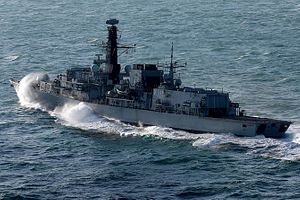A British Royal Navy warship will transit the South China Sea in March, according to remarks made by British Defense Secretary Gavin Williamson on Tuesday during his visit to Australia. Williamson said the transit would assert freedom of navigation in the area, where six different claimant states disputed various islands and features.
The Royal Navy Type 23 frigate HMS Sutherland, which embarked on a deployment to the Pacific Ocean earlier this year along with HMS Argyll, another Type 23 frigate, will transit the South China Sea while returning to the United Kingdom. “She’ll be sailing through the South China Sea and making it clear our navy has a right to do that,” Williamson said, describing the Sutherland‘s planned operations.
It’s unlikely that HMS Sutherland will undertake a freedom of navigation operation, or FONOP, within 12-nautical-miles of a disputed China-held feature like the U.S. Navy has done. Williamson reportedly told the Australian that the UK “support(s) the U.S. approach on this,” while leaving open the precise type of operation HMS Sutherland would undertake.
The announcement regarding the deployment of a Royal Navy warship to the Asia-Pacific was already made last year, in more precise terms. Former Defense Secretary Michael Fallon said that the UK had not “finalized exactly where that deployment would take place,” but that the UK would not be “constrained by China from sailing through the South China Sea.”
“We have the right of freedom of navigation and we will exercise it,” Fallon had added.
China has nevertheless protested activities by extra-regional military vessels in the South China Sea, issuing warnings to the Japan, the United States, and Australia in the past.
When asked about the British announcement, the Chinese Foreign Ministry was relatively subdued, though somewhat wary: “We hope that relevant parties, especially non-regional countries, could respect the efforts made by regional countries to safeguard peace and stability in the region,” a spokesperson for the Foreign Ministry noted.
“All countries are entitled to the freedom of navigation and overflight in the South China Sea as per international law,” the statement also noted. China claims to support freedom of navigation in the South China Sea, but differentiates between navigational rights for civilian and military vessels.
The United Nations Convention on the Law of the Sea, which China is a party to, provides for military navigation within the territorial seas of coastal states, provide vessels adhere to certain requirements.
The Global Times, a non-authoritative state-owned newspaper, also ran an editorial criticizing Williamson’s speech, saying the Royal Navy “should behave modestly when passing through the South China Sea.”
“By acting tough against China, Britain’s Ministry of Defense is trying to validate its existence and grab attention,” the editorial added.
The UK has maintained interest in the South China Sea in recent years as the disputes there have gained attention amid China’s construction of artificial islands and the 2016 award by the Hague-based tribunal in the Philippines’ 2013 case against China.

































